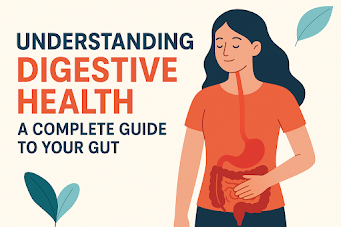

Your gut is more than just a part of your digestive system—it’s often called your body’s “second brain.” From breaking down food to absorbing nutrients and supporting immunity, your digestive health plays a key role in your overall well-being. Yet, many people overlook its importance until issues like bloating, constipation, or indigestion arise. This guide will help you understand your gut better and how to keep it healthy.
The digestive system is responsible for converting food into the energy and nutrients your body needs. It also houses trillions of beneficial bacteria, collectively known as the gut microbiome, which help regulate digestion, fight infections, and even impact mood and mental health. Poor digestive health can lead to discomfort, nutrient deficiencies, or chronic illnesses.
Your digestive system is responsible for breaking down food, absorbing nutrients, and eliminating waste. When something goes wrong, your gut usually sends out warning signals. Recognizing these early can help prevent more serious health issues.
Occasional bloating is normal, but frequent or painful bloating may indicate food intolerances, irritable bowel syndrome (IBS), or poor gut balance.
A burning sensation in the chest or throat, especially after meals, could be a sign of gastroesophageal reflux disease (GERD).
If you pass stools fewer than three times a week or experience hard, painful stools, it may signal dehydration, low fiber intake, or other underlying issues.
Loose, watery stools may result from infections, food intolerances, or chronic digestive conditions like Crohn’s disease or ulcerative colitis.
Persistent stomach aches could be linked to indigestion, ulcers, gallstones, or gastrointestinal infections.
Sudden weight loss or gain without dietary changes may be due to malabsorption of nutrients, thyroid issues, or gut imbalances.
Since nutrient absorption happens in the gut, digestive problems can lead to vitamin and mineral deficiencies, causing constant tiredness.
This should never be ignored. It may indicate hemorrhoids, ulcers, or more serious conditions like colon cancer.
Fruits, vegetables, whole grains, and legumes help regulate bowel movements and feed good gut bacteria.
Water supports digestion by helping break down food and absorb nutrients effectively.
Yogurt, kefir, and fermented foods (probiotics) along with garlic, onions, and bananas (prebiotics) maintain a healthy gut microbiome.
Stress can disrupt gut-brain communication, worsening issues like IBS and indigestion. Practices like yoga, meditation, and deep breathing can help.
Physical activity boosts metabolism and helps maintain bowel regularity.
Excess sugar, unhealthy fats, and alcohol can damage gut bacteria and irritate the digestive system.
If you experience persistent symptoms like severe abdominal pain, blood in stools, chronic constipation, or unexplained weight loss, consult a gastroenterologist for proper diagnosis and treatment.
Your gut health is central to your overall wellness. By nourishing your digestive system with the right diet, lifestyle, and habits, you can improve not just digestion but also immunity, energy, and mental well-being. A healthy gut truly means a healthier life.

Welcome to Atlas Multi Specialty Clinics, dedicated to prioritizing your health and well-being in the heart of Hyderabad’s Financial District, Telangana.
Atlas multi specialty clinics, The District, l202,
Financial District, Nanakramguda,
Hyderabad, Telangana 500032
atlasmultispecialityclinic@gmail.com
+91-7993366823
+91-9393000124
Copyright © Atlas Multi Specialty Clinics. All rights reserved.